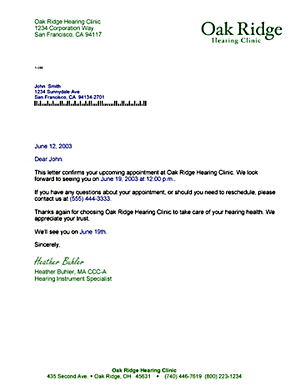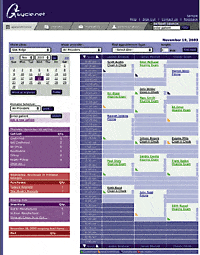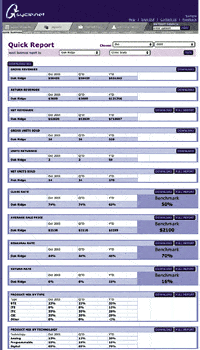Some might call it a revolution in the way software is delivered, maintained, and sold. Instead of purchasing software and installing it on stand-alone systems, businesses are using software via the Internet.
Companies that provide this type of software are called Application Service Providers (ASP). Rather than purchasing a software application—in this case a Patient Management System—you “subscribe” and use it online. This model is carrying over from consumer services to businesses and back again. Examples include Tivo for your TV, OnStar for your car, and XM Radio; you subscribe to a service and pay as you go, effectively eliminating a substantial capital investment or the hassle of maintaining the software.
Yet, this is not an entirely new model. The best analogy is probably a gym membership. You could purchase home fitness equipment, like a Universal Gym, for thousands of dollars. If you did, you would have to maintain it, and it would remain the same. It’s static: the same piece of equipment day in, day out, and eventually, you’ll probably stop using it and/or get rid of it. Granted, a set of weights will last forever; software, on the other hand, does not. When you join a gym, you pay a reasonable fee each month for the best, latest equipment, training techniques, etc. The equipment is always changing (eg, high-tech treadmills), and you benefit from that. It is maintained for you. There are people to show you how to use it. By joining one gym, you likely have national access to any facility in the chain. Additionally, as you get older and your needs or goals change, you can probably find different equipment that meets your needs. And if you find a better gym, you can always switch.
Accessing software over the Internet is the new paradigm for the way companies do business. Companies like Oracle and IBM are taking the lead in promoting the “on demand” ASP model to the world. Most Fortune 500 companies run some part of their businesses over the Internet. Another ASP is Salesforce.com. Spend five minutes on their Web site and you’ll see close to 1400 companies—the likes of Avis, AOL, Nokia, and more—with over 225,000 users managing their sales leads online. Look over the shoulder of a salesperson at a Cingular/ATT store and you’ll see that their entire system is web based. The head office can change prices and offers, and the changes become effective in every store within seconds. QuickBooks Online currently has over 20,000 customers.
What do all these examples have in common? You never have to load a piece of software onto a computer. In all cases, the application is accessed through a Web browser like Internet Explorer.
Sycle.net, which we believe is the only ASP for the hearing care industry, currently has over 700 customers and 1500 users. The software application is delivered to dispensing offices over the Internet. It’s accessible any time. The most basic computer and an Internet connection enables the most up-to-date software available. You no longer wait months or years for software updates. Every time there’s a change, it’s instantly yours when you log on. Additionally, you can access your practice management system from anywhere at any time of the day.
What Does Your Patient Management System Really Cost?
A big difference between stand-alone software and an online application is the cost of ownership. The software industry refers to this as “total cost of ownership,” which also takes into consideration the hidden costs.
The old model is that you make a substantial software investment—which generally includes an even more substantial hardware investment (ie, a hidden cost)—and then you own your patient management system. The reality is that you have become a slave to your patient management system. The onus is on you to manage and maintain your software, which is fraught with hidden costs (of both time and money). You are now the head of your own IT department; you have to upgrade your hardware; you need to upload software updates, which come once or twice a year (sometimes a fearful event if they threaten to bring down your entire system). And if you want to see the data on more than one computer, there’s a nebulous thing called “networking,” which usually involves a computer consultant, possibly a server, and definitely more money. There are also regular data back-ups, HIPAA compliance, viruses, and firewalls to maintain.
With the speed at which technology changes, it’s a full-time job just to keep up. The ASP not only delivers your software; it also eliminates almost all of the hidden costs. It’s like having your own IT department, which means you can focus on doing what you do best.
Expense or Investment?
Software is often seen as a necessary evil, and definitely represents an expense. Online applications are designed to be the “best of breed” to save time and also to grow your business. Many ASP features are designed to increase a practice’s net revenue and reduce labor costs, and some Sycle.net customers have reported a 20% increase in sales and a 70% increase in practice efficacies. As an added benefit, the monthly fee is a line-item expense (as opposed to purchasing software and hardware, which has to be depreciated).
There are several other benefits to an ASP approach for business management software:
Best Practices. When customers are able to contribute ideas and suggestions—and when there is a platform to implement and deliver them—the end result is a “best of breed” product. The software grows with you and your industry. This is clearly one of the greatest assets of an online application. It is best practices and economies of scale on the most significant of all levels.
Customer Relationship Management. Five years ago, a technology that would allow hearing care professionals to automatically and simultaneously maintain a relationship with 1000-2000 patients didn’t exist. Can you imagine trying regularly to call or write all of them?
Many hearing care practices have over 1,000 current customers at any given time. With the technology that’s available today, it’s possible to maintain a scheduled automatic series of personalized written communications with your patients. An online system allows you to set up customized mail to go out automatically, based on what happened during the patient meeting, when their warranty expires, the date of their last check-up, etc (Figure 1). Rather than you searching your database and sending reminders, the system proactively and automatically sends out the letters for you. Most ASP systems will contract with a bonded mail house and send mail with a script font signature. All you have to do is update the patient record and your work is finished.

FIGURE 1. Confirmation letters can be sent automatically using the ASP.
The cost? A few dollars per patient. When you consider that your patients are constantly being bombarded with low-cost offers from your competitors and that a typical patient will buy three sets of hearing aids from you, we believe this represents a worthwhile investment.

Business Intelligence
Business Intelligence is instant data you can use to make proactive—as opposed to reactive—decisions. An online application can provide you with a digital dashboard of critical business metrics you can use to manage your business, such as units sold, units returned, closing rates, binaural fitting percentages, number of new patients, hearing tests scheduled, open appointments that are available and more (Figures 2-3). This information lets you make decisions and changes proactively; you can fill slots, increase hearing tests, and be made aware of trends that might concern you (or assure you that your business is on the right track).
Whoever Manages Their Data Best Wins!
Do you have the ability to quickly determine which of your customers have three-year-old hearing aids, are tested-not-sold, have a warranty about to expire, or have a birthday this month? Do you know which of your patients are wearing analog technology or which have a high-frequency hearing loss? These questions can be answered and mailing lists created with up-to-the-minute data. This is another advantage of an ASP. All of your data, whether you have one practice or one hundred, is stored in one database. Stand-alone systems have their own database, and as soon as you have more than one active database, you’re in trouble. Using an ASP lets you keep all your data in one database. With a few clicks, you can query and market to specific segments of your database without having to jump through hoops. You can download your lists to Excel and hand them over to your mail house.

Security, Viruses, and Hurricanes
Most practices have their entire database on a computer under the front office desk, and in many cases, it’s not backed up. There’s a nagging voice in the back of many practice owners’ minds, “I really should back up my database,” or “I really should back up my accounting records.”
Your computer is at risk in a variety of ways: viruses are running rampant across the Internet and can infect a computer’s hard drive, wiping it clean; if it is backed up, chances are that you just lost a day rebuilding an old computer; if you don’t have a firewall, your computer is exposed to hackers on the Internet. Hurricanes and other natural disasters completely leveled a number of clinics in Florida last year, and many businesses lost all their electronic files. Similarly, a computer crash can easily put a practice out of business for a few days or weeks. ASPs have multiple and redundant servers that back up every piece of information in real time; additionally, nightly tape back ups are taken off-site. IBM, Sycle.net’s data partner, maintains 57 data centers around the world. They are encased in concrete, have days of back-up power, are plugged directly into the Internet backbone, and a hand-print is required to gain entry into the building where they are housed. This takes the worry out of data back up.
HIPAA
Most practices are not HIPAA compliant for a number of reasons. However, the most common infraction of practices relative to HIPAA laws are that practices don’t maintain a firewall for their computers and the computers are not physically locked. With an ASP solution, both of these issues are handled, thereby making any practice instantly HIPAA compliant in these respects. Practices need not spend the money on a firewall (or maintain it) because all of the data going over the Internet is encrypted in the same way a brokerage or banking Web site’s data is encrypted. Secondly, as mentioned earlier, the data is physically secured in accordance with HIPAA requirements.
Integration with Other Services
The less frequently you have to switch from one application to another the better. Entering the same data twice is even more time consuming. Frequently, an ASP will identify and partner with applications that are critical to an industry. In the case of hearing health care, Sycle.net has integrated with QuickBooks and enables the electronic submission of insurance claims through WebMD, the nation’s largest insurance claim clearinghouse. Both of these applications are integrated with the Sycle.net ASP.
On-demand software is the next revolution in the way software is delivered, maintained, and sold. An Application Service Provider can offer to a business: anytime, anywhere access; constant and seamless upgrades; pay-as-you-go service that is less expensive when you factor in the hidden costs; automated direct marketing; security; HIPAA compliance, and more. A good ASP provider is like having your own 24/7 IT department traveling with you wherever you go.
| This article was submitted to HR by Ridge Sampson, president and founder of Sycle.net and Ozone Online, San Francisco, who also has many years of experience in the hearing industry. Correspondence can be addressed to HR or Ridge Sampson, Sycle.net, 1335 Columbus Ave, 3rd Floor, San Francisco, CA 94133; email: [email protected]; www.sycle.net. |





